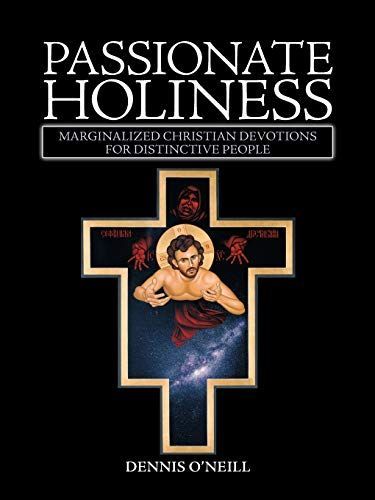
Passionate Holiness Marginalized Christian Devotions for Distinctive Peoples
NEW 2010 B&W Edition Archbishop Desmond Tutu of Cape Town once said with regard to South Africa's Apartheid policy, "One of the ways of helping to destroy a people is to tell them that they don't have a history, that they have no roots." He recently described homophobic discrimination "as totally unacceptable and unjust as Apartheid ever was." Unfortunately, it has been particularly difficult for some gay, lesbian, bisexual, and transgendered Christians to remain connected with and identified with their own faith traditions because some of these traditions not only treat them as people of secondary status but teach Christian history as though no people of same-gender attraction or opposite-gender identity had any noteworthy place in it and had made no significant contributions at all to Christian tradition.Passionate Holiness tries to remedy this situation by explaining why acquaintance with the stories of Sts. Polyeuct and Nearchus, Sts. Sergius and Bacchus, Christ/Holy Wisdom, Sts. Matrona, Perpetua and Felicity, Brigid and Darlughdach, and many others with whom gender minorities can identify can help them to connect with their own history and spiritual legacy and empower them to face a brighter future with a sense of optimism and inclusion. The story of the removal of the feast of Sts. Sergius and Bacchus from the liturgical calendar of the Roman Catholic Church in 1969 - ironically, the very year New York's Stonewall Riots launched the gay liberation movement - is a particularly revealing example of how far some religious authorities will go to keep gender minorities distanced from their own history. This is all explored in Passionate Holiness. "It's a marvelous, beautiful book." Ursula Vaughan Williams poet, novelist, and widow of composer Ralph Vaughan Williams "It was a fascinating study. Congratulations on a job well done." Andrew M. Greeley priest, sociologist, novelist "Many thanks for sending me your book Passionate Holiness, which I enjoyed very much. It is a fascinating account of the cult of Holy Wisdom, mixed with stories of various 'distinctive people' and the roles they have played in the history of the Church. It is full of saints, sinners, heretics, martyrs, and those who persecuted them. Some of these people, and the ideas they believed in, have featured in my novels, though there was much that I was not aware of. The material in the Russian and Irish chapters were new to me. You say at the beginning of Chapter VII that the reader may cry out "Too much information". Not me! Passionate Holiness is a work of remarkable scholarship, and I wish it had been published before I wrote my Byzantine novels, rather than afterwards. If I ever return to Byzantium as a subject, I am sure I will find your book invaluable. The icons that illustrate the book are beautiful. You are lucky to have access to works by such gifted artists. If only my publisher had commissioned something similar for the cover of Theodore. Maybe next time!" Christopher Harris English novelist, author of "Theodore," "Memoirs of a Byzantine Eunuch," and "False Ambassador" "Here's something the antigay modern Roman Catholic Church would like to forget: In the early years of Christianity, homosexual saints were worshipped too, as Dennis O'Neill reminds us. O'Neill is a Chicago-based Catholic pastor who 11 years ago founded The Living Circle, a spirituality center devoted to GLBT people and their friends. In 1995 the Circle hosted an art exhibit entitled "Passionate Holiness" that displayed such holy icons as Saint Boris and George the Hungarian and Saints Brigid and Darlughdach of Kildare. O'Neill's retelling of such stories, plus striking color illustrations, will surprise and inspire any reader, gay or not." Anne Stockwell Review from "The Advocate", May 24, 2005 issue, p. 82. "Passionate Holiness is indeed a remarkable book, unlike any other that I know of. Its scope